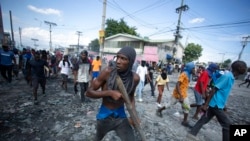The United States plans to increase security and humanitarian assistance to the people of Haiti, while imposing visa restrictions on current and former officials involved in criminal gang operations that are blocking supplies as the Caribbean nation battles an outbreak of cholera.
But the U.S. is still reviewing Haiti’s request for an international specialized armed force to stop gang violence in the island nation.
On Wednesday, U.S. Secretary of State Antony Blinken said Washington is accelerating the delivery of additional humanitarian relief to Haiti, as well as working to “increase and deploy in the coming days security assistance to the Haitian National Police.”
Blinken also said in a statement that the U.S. is “announcing a new visa restriction policy under section 212(a)(3)(C) of the Immigration and Nationality Act” against Haitian officials and other individuals involved in the operation of street gangs and criminal organizations that are blocking lifesaving humanitarian support. Such actions may also apply to these individuals’ immediate family members.
Heavily armed gangs control parts of the capital, Port-au-Prince, and have blocked access to the country’s main fuel terminal since mid-September. This has worsened the already dire humanitarian situation, affecting the availability of electricity, clean water, garbage collection and the ability of hospitals to operate at a time when the country is facing a deadly resurgence of cholera.
The U.S. Coast Guard will deploy one of its cutters to patrol off the coast of Port-au-Prince at the request of the Haitian government.
The U.S. did not disclose the amount of the increase in aid.
“In addition to the security response, we’ve provided since last year over $171 million in lifesaving humanitarian assistance to Haiti, as well as $90 million to strengthen the Haitian National Police,” a senior administration official told reporters on Wednesday during a briefing. The official spoke on condition of anonymity as is customary when briefing reporters.
Another senior U.S. official said the United States is working closely with Mexico through the U.N. Security Council to put forward “specific actions to improve the security situation” in Haiti.
Both officials declined to say if the U.S. would consider sending troops to Haiti or lead a rapid action force that the U.N. has proposed.
Last week, the United States and Mexico introduced a Security Council resolution that officials said built on UNSC Resolution 2645 to propose “specific sanctions measures” and call for “additional security steps to enable the international community to address the many challenges facing the people of Haiti.” A vote is expected next week.
UNSC Resolution 2645 on Haiti was adopted July 15, 2022, to address gang violence and to help Haitian national authorities and civil society work to strengthen the rule of law and to promote respect for human rights.
The State Department’s top diplomat for the Western Hemisphere, Brian Nichols, left Wednesday to lead an interagency U.S. delegation to Haiti for a two-day official visit. Military officials from the U.S. Southern Command, the Pentagon and other officials from the State Department, as well as the White House, are among the U.S. delegation.
The delegation will assess how the U.S. government can provide various forms of assistance, while urging political factions within Haiti to “rise above their differences” for improved security and a return to democratic order, according to the State Department.
Last Friday, Haiti’s government authorized Prime Minister Ariel Henry to request the immediate deployment of an international specialized armed force to help stop the criminal gangs. The gangs are seeking to exploit the political vacuum left by the assassination of President Jovenel Moise at his home in Port-au-Prince on July 7, 2021.
State Department spokesperson Ned Price said on Tuesday that the United States is reviewing the prime minister’s request in coordination with international partners “to determine how we best can contribute to the removal of security constraints on medical and humanitarian measures aimed at halting the spread of cholera.”
“We strongly condemn all of those who stand in the way of the equitable and immediate distribution of much-needed humanitarian supplies. This is a status quo that cannot persist,” said Price, while declining to say if the United States would consider sending troops or police to Haiti.
U.N. Secretary-General Antonio Guterres is backing Haiti’s call for an international armed force, providing support for the Haitian National Police.
VOA’s United Nations correspondent Margaret Besheer contributed to the report.





